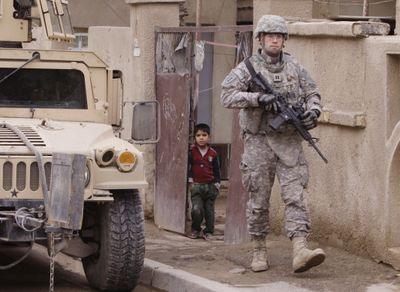Iraq transition plan still lacking key players
U.S. general says committees still picking members

BAGHDAD – Most of the committees created to guide the transition from U.S. to Iraqi control of security in the country have yet to appoint members, let alone convene, the senior American general in Iraq said Tuesday.
Committees assigned to deal with U.S.-led combat operations and jurisdiction over U.S. military personnel are among those that have not met even as Iraq moves toward sovereignty, U.S. Gen. Ray Odierno told reporters.
“The Iraqis are still forming their committees and who will be on the committees,” Odierno said.
Odierno said there was no cause for alarm, and he emphasized that progress was being made in such key areas of the transition as control of Iraqi air space and the Green Zone safety area for Iraqi government offices and foreign embassies.
Odierno said the Iraqi government was working to pick the best members for the approximately 14 committees, which focus on matters such as communication frequencies, entry into the country, the handover of bases, and training and equipping Iraqi forces.
“This is about a partnership and a spirit. We know what that is, we know what the intent is. … As issues come up we’ll resolve them with these committees,” he said.
The bilateral pact signed last month by the Iraqi and U.S. governments calls for U.S. troops to withdraw to bases outside cities by the end of June 2009 and for all U.S. forces to withdraw from Iraq by the end of 2011.
The pact, which replaces the U.N. mandate that charged U.S. forces with responsibility for Iraq’s security until the end of this year, was the subject of drawn-out negotiations. Its opponents charged that it jeopardized Iraq’s sovereignty and extended America’s dominance in Iraq. The agreement is expected to go before a popular referendum in Iraq next summer.
U.S. forces already have started functioning as if Iraq were in charge of the country’s security. Since Dec. 1, U.S. troops have sought arrest warrants from Iraqi judges for almost all detentions, and, since the spring, U.S. forces have notified Iraqi commanders of most combat operations.
However, some key U.S.-Iraqi security committees have yet to meet, including the umbrella grouping for all military policy, known as the Joint Military Operations Coordination Committee. Iraq Prime Minister Nouri al-Maliki is submitting names to his cabinet and presidency council for approval. The committee is expected to be headed by Odierno and Iraqi Defense Minister Abdul-Qader al-Obeidi.
Issues with potential for disagreement include the conditions under which U.S. forces could launch raids independent of Iraqi troops. Currently, U.S. security commanders inform their Iraqi counterparts. After Jan. 1, if an Iraqi commander objects, in principle, it would go to the next level in the chain of command for resolution.
“We are coordinating operations,” Odierno said.